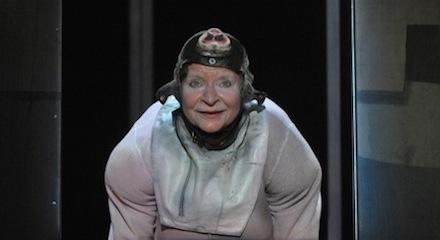The End of ‘Civilization’ as We Know Us
By • March 8, 2012 0 1428

In Jason Grote’s new play “Civilization (All You Can Eat),” now getting a sharp and haunting staging at Woolly Mammoth Theatre, everybody’s hungry all of the time. Hungry, not so much for food, as for the top-heavy buffet of life and stuff that’s out there like a sparkling city-as-a-mall, but now beyond the reach of our burdensome absurdly high-interest credit cards
The characters—the humans in any case—in “Civilization” are leading lives built on dreams that have morphed into settle-for-it-reality. A respected college professor and intellectual now travels the inspirational talk circuit, promoting corporate solutions in a time of chaos. A middle-class mom struggles to keep her home, the love of her addled daughter and her sad sanity. A wanna-be-filmmaker becomes somewhat famous for making a Twix commercial that goes viral. Would-be actors strive to stay alive—one doing voice overs for Japanese sexual computer games, the other doing standup after getting fired from the commercial. A young girl tries to help her mom make the mortgage by doing a home-made porno video with her boyfriend.
And so on: all of these peoples are barely hanging on or seeing their lives alter inexorably in the time of our troubles, the beginning of the great recession and the squandered hopes of the Obama election.
Actually, there’s one character whose hunger and hopes are insatiable and undeniable—that would be Big Hog, a pig who escapes the food chain treadmill he is on by acquiring a greedy, fragmented human consciousness. What he wants is food and knowledge, and he wants to rise above himself to a state of man as striver. He gobbles up rabbits, pop culture tidbits, junk food and junk news and know-how. He’s the ominiverous beast in our midst.
Sarah Marshall, the gifted Washington actress who once played a dog in a play called “Sylvia” and played her with gusto and believability, channels Big Hog on his journey through mayhem, madness, murder and mud, until he scales the heights of becoming a mysterious business tycoon—could be a software genius, could be Trump, could be what he is which is big hog, sitting down to an expensive dinner with the film-maker and consuming the old-fashioned way.
Big Hog is frightening, but the plight of the characters as they stumble connected and disconnected, frayed and clueless is pretty scary, too. There’s nothing quite so uneasy as the dinner which features the film-maker, her husband and woman—an out-of-it drowning honorary member of the margilanized class.
Grote energizes his play like Robert Altman, the late film director of “Mash” and “Nashville” fame, a style in which the periphery noise and talk is both intrusive and instructive to what’s happening with the central characters. You can do that just by looking around when you’re experiencing Grote’s play: I saw people who had taken advantage of Woolly’s promotional materials (pig snouts you can wear) and so on, on their cellphones keep up with Big East basketball while snorting like Big Hog. That seems to be the point here—all of the characters are weighed down by their struggling, by their connections to each other, by their burdens, by the dilution of their dreams. Those dreams, like their bank accounts, have become thin and their voices tinny. They’re living under a sad, gloomy cloud of history which keeps right on raining and thundering, the wind blowing, the wolf at the door.
Woolly Artistic Director Howard Shalwitz has staged this fragmented play with style and energy, you never get bogged down although there are enough opportunities. A talented cast — especially Naomi Jacobson as the struggling mother, Jenna Sokolowski, looking for love and an acting part in all the wrong places, Daniel Escobar doing standup and especially the affecting Casie Platt as Jade, the young girl just trying to help — makes connections to us, which important to us.
But it is Big Hog who makes the biggest impression. It’s best perhaps not to think about him. He’s a feral “Babe,” who feels he has achieved a kind of communion with us. Maybe he has.
“Civilization” is at the Woolly Mammoth Theatre through March 11.

